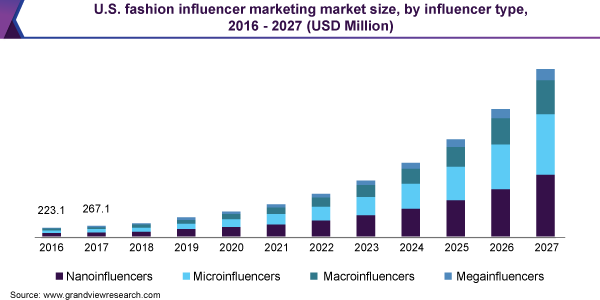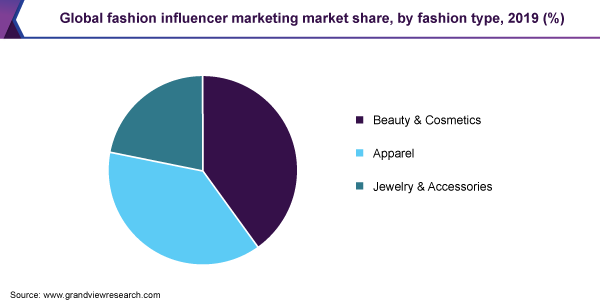- Home
- »
- Digital Media
- »
-
Fashion Influencer Marketing Market Size Report, 2020-2027GVR Report cover
![Fashion Influencer Marketing Market Size, Share & Trends Report]()
Fashion Influencer Marketing Market Size, Share & Trends Analysis Report By Influencer Type (Megainfluencers, Macroinfluencers, Nanoinfluencers), By Fashion Type, By Region, And Segment Forecasts, 2020 - 2027
- Report ID: GVR-4-68039-190-4
- Number of Report Pages: 154
- Format: PDF, Horizon Databook
- Historical Range: 2016 - 2018
- Forecast Period: 2020 - 2027
- Industry: Technology
Report Overview
The global fashion influencer marketing market size was valued at USD 1.5 billion in 2019. It is expected to expand at a compound annual growth rate (CAGR) of 35.7% from 2020 to 2027. In a bid to maximize their reach and capture a larger audience, fashion brands are adopting influencer marketing strategies. Technological disruption in advertising practices and marketing strategies has helped companies invest more efficiently in marketing campaigns and get a higher return on investment (ROI). Influencer marketing enables fashion brands to maximize their reach and promote their products in more innovative ways to relate to brand values. The growing use of social media platforms globally is adding to the incremental benefits of influencer marketing for fashion brands. This factor is projected to further fuel the expansion of the market in near future.

Furthermore, low internet charges in countries such as India, Italy, Poland, and France encourage people to utilize data services, subsequently resulting in higher social media proliferation. High penetration and usage of social media platforms, such as Facebook and Instagram, among millennials and the need to adapt to fast fashion are encouraging fashion brands to invest more in influencer marketing practices. People from the age group of 18 to 34 use Instagram the most, making it the most sought-after channel by fashion influencers and brands to advertise their products.
Fashion influencers provide companies an alternative channel to indulge in product sales and better identify the choices of their audience. Users engage with their choice of influencers via polls, comments, and direct messages, asking the latter to create content related to clothing, skincare, jewelry, cosmetics, and footwear. This aids influencers in conveying profound insights about consumer demands and expectations to brands. For instance, Marks and Spencer Group plc actively indulge in influencer marketing, which has helped it generate awareness and demand for its bath and skincare range and the company’s primary clothing segment in recent years.
Social Search Engine (SSE) and Social Search Optimization (SSO) also offer promising growth opportunities to the industry. High use of social media platforms such as Facebook, Twitter, and Instagram in countries such as the U.S., the U.K., India, and platforms such as WeChat and Red Book App in China have acted as catalysts for building the presence of several brands on digital media. SSE and SSO help optimize content on social media platforms by filtering content such as page descriptions, articles, and photos, which improves organic search results and offers precise buying options to users. The use of SSE and SSO is essential in the fashion influencer marketing market as fashion influencers mention the brands’ and companies’ products being showcased, promoting the use of advertised products, thus offering better insights and search results to consumers.
Influencer Type Insights
The nano influencer segment captured a revenue share of over 39% in 2019. This can be attributed to a higher engagement rate and the ability to interact with niche audiences, thus offering brands a better chance of penetrating the market more effectively. Nano influencers also have more tight-knit communities with their audiences and guarantee a lesser risk of engaging with fake followers, thus providing more filtered leads for companies. Moreover, leveraging nano influencers for marketing offers a more budget-friendly option to brands and agencies, offering growth opportunities to the market.
The micro influencer segment gained significant revenue share in 2019 due to higher flexibility in working with them than macro and mega influencers. Micro influencers offer instant promotion of a company’s services or products with significant conversation rates. Micro influencers have a more extensive following than nano influencers, enabling marketers to understand a given region's demographics and audience mentality more effectively, thus helping curate more specific products, designs, and content. Micro influencers can also help fashion brands improve their trustworthiness as their audiences relate with them, which is essential in developing effective customer relations.
Fashion Type Insights
The beauty and cosmetics segment dominated the market in 2019, with a revenue share of over 38%. This can be attributed to the rising focus of beauty and cosmetics companies on using social media platforms to generate a positive brand image and expand sales. The choice of cosmetics is often influenced by personal preference, skin tone, and type of skin, which is why people rely more on influencers to offer the right advice via promotional videos or makeup tutorials. Moreover, the general trend among influencers to establish their beauty brands, for instance, Summer Fridays by Lauren Gores and Marianna Hewitt, & UBeauty by Tina Craig, is one of the primary growth drivers.

The apparel segment gained significant revenue share in 2019, thanks to the rising popularity of fast fashion among millennials. Fashion influencers often wear brand-sponsored apparel and encourage their followers to emulate or create a new look and share their content on social media using tags and hashtags. This helps companies generate awareness and track engagement among their target audiences. E-commerce companies, such as Myntra in India, have started conducting fashion influencer talent shows in a digital reality format to further raise interest in influencer marketing practices among audiences.
Regional Insights
North America dominated the market for fashion influencer marketing in 2019 with a revenue share of over 35%. This can be attributed to the high usage of social media and high-speed internet in the region. A sizeable share of American Instagram users falls in the age bracket of 18 to 34. This offers brands and marketers the chance to cater to the demands of a sizeable share of the audience. Furthermore, the U.S. Federal Trade Commission (FTC) has made it mandatory for sponsored posts to be labeled. It offers more detailed insights regarding campaign performance and brand visibility, thus helping regulate market growth.
Europe captured a significant revenue share in 2019, attributed to the presence of several major luxury fashion brands such as Christian Dior SE, Yves Saint Laurent SAS, and Chanel in the region. The region also conducts several fashion weeks, which helps influencers to showcase their outfits and accessories. Furthermore, the presence of a significant blogging culture in the Nordics that helps influencers showcase their content via blogs is projected to offer an impetus to market growth.
Key Companies & Market Share Insights
Service providers in the fashion influencer industry have started offering AI-enabled search engines that provide detailed insights about the influencer and help brands decide their choice of influencer. For instance, InfluencerDB and Upfluence Inc. offer AI-enabled analytics services, allowing companies to compare campaigns and influencer performance more efficiently. Companies have also started launching dedicated platforms for the fashion influencer market. In July 2019, Launchmetrics launched an interactive microsite, Insights100, that helps brands and agencies gain access to comparative benchmarking against their peers by measuring marketing campaign performance and analyzing the effectiveness of investments.
The rising user base of social media websites such as YouTube and Facebook has been instrumental in driving the growth of the market. In September 2019, YouTube launched the ‘/Fashion,’ a unique hub for beauty and fashion content. Fashion brands are also trying to engage with more versatile influencers to offer them insights into art direction and filmmaking. This has helped in building more genuine connections with their consumers. Some of the prominent players in the global fashion influencer marketing market are:
-
AspireIQ
-
HYPR Brands
-
InfluencerDB
-
IZEA
-
Klear
Fashion Influencer Marketing Market Report Scope
Report Attribute
Details
Market size value in 2020
USD 2.02 billion
Revenue forecast in 2027
USD 17.12 billion
Growth Rate
CAGR of 35.7% from 2020 to 2027
Base year for estimation
2019
Historical data
2016 - 2018
Forecast period
2020 - 2027
Quantitative units
Revenue in USD million and CAGR from 2020 to 2027
Report coverage
Revenue forecast, company ranking, competitive landscape, growth factors, and trends
Segments covered
Influencer type, fashion type, region
Regional scope
North America; Europe; Asia Pacific; Latin America; MEA
Country scope
U.S.; Canada; U.K.; Germany; China; India; Japan; Brazil; Mexico
Key companies profiled
InfluencerDB; IZEA; Klear; Launchmetrics; Mavrck
Customization scope
Free report customization (equivalent to up to 8 analyst working days) with purchase. Addition or alteration to country, regional & segment scope
Pricing and purchase options
Avail customized purchase options to meet your exact research needs. Explore purchase options
Segments Covered in the ReportThis report forecasts revenue growth at global, regional, and country levels and provides an analysis of the latest industry trends in each of the sub-segments from 2016 to 2027. For this study, Grand View Research has segmented the global fashion influencer marketing market report based on influencer type, fashion type, and region:
-
Influencer Type Outlook (Revenue, USD Million, 2016 - 2027)
-
Mega influencers
-
Macro influencers
-
Micro influencers
-
Nano influencers
-
-
Fashion Type Outlook (Revenue, USD Million, 2016 - 2027)
-
Beauty & Cosmetics
-
Apparel
-
Jewelry & Accessories
-
-
Regional Outlook (Revenue, USD Million, 2016 - 2027)
-
North America
-
U.S.
-
Canada
-
-
Europe
-
Germany
-
U.K.
-
-
Asia Pacific
-
China
-
India
-
Japan
-
-
Latin America
-
Brazil
-
Mexico
-
-
MEA
-
Frequently Asked Questions About This Report
b. The global fashion influencer marketing market size was estimated at USD 1.5 billion in 2019 and is estimated to reach USD 2.02 billion in 2020.
b. The global fashion influencer marketing market is expected to grow at a compound annual growth of 35.7% from 2020 to 2027 to reach USD 17.12 billion by 2027.
b. The nanoinfluencers segment dominated the global fashion influencer marketing market with a revenue share of 39.70% in 2019. This can be attributed to a higher engagement rate and the ability to interact with niche audiences, thus offering brands a better chance of penetrating the market more effectively.
b. Some key players operating in the global fashion influencer marketing market include AspireIQ, HYPR Brands, InfluencerDB, IZEA, and Klear.
b. Key factors that are driving the fashion influencer marketing market growth include technological disruption in advertising practices and marketing strategies, the growing use of social media platforms globally, and rising focus companies on using social media platforms to generate a positive brand image.
Share this report with your colleague or friend.
![gvr icn]()
NEED A CUSTOM REPORT?
We can customize every report - free of charge - including purchasing stand-alone sections or country-level reports, as well as offer affordable discounts for start-ups & universities. Contact us now
![Certified Icon]()
We are GDPR and CCPA compliant! Your transaction & personal information is safe and secure. For more details, please read our privacy policy.
We are committed towards customer satisfaction, and quality service.
"The quality of research they have done for us has been excellent."





